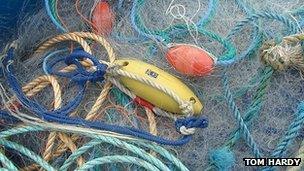Cornwall Wildlife Trust's porpoise success
- Published

In the trust's trial fewer harbour porpoises were found around those nets which had pingers attached
A project testing a device to stop dolphins and porpoises getting caught in fishing nets has been a success, Cornwall Wildlife Trust has said.
During the 12-month trial, there was a 48% fall in harbour porpoise activity around nets with devices called pingers attached.
The pingers are placed on the nets and let out a noise to repel the creatures, a spokeswoman said.
The trust said it hoped it could be a solution to the issue.
Four boats in Cornwall were involved in the trial in which pingers were attached to some nets.
Acoustic devices on the nets recorded whether more or fewer animals were around those with pingers.
The results, which have been published in the Journal of Cetacean Research and Management, showed fewer harbour porpoises were around the nets with the pingers.
Ruth Williams from the trust said: "We are delighted that the trials proved such a success, not only in testing what could be an essential tool in protecting our enigmatic and precious inshore dolphins and porpoises, but also in building good relationships with the fishing industry in this county.
"The feedback from the skippers involved and the trust's investigation have concluded that there are no significant practical problems using pingers on the fishing vessels.
"The initial cost - about £50 - and short battery life of the pingers are an issue, but the trust is dedicated to continuing this research to find a suitable commercial pinger that can be used effectively on all inshore fishing boats."
- Published4 May 2012